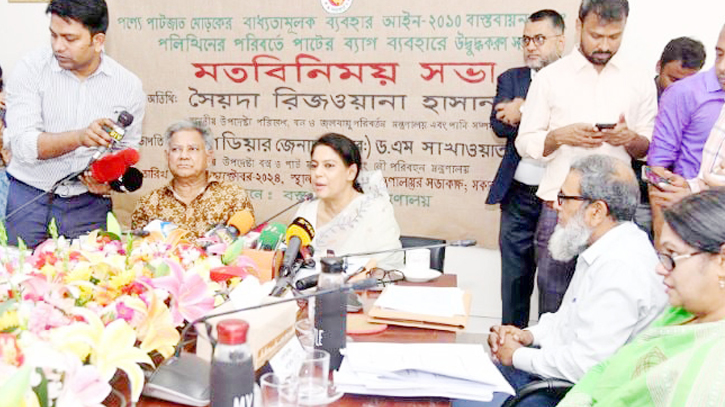
Photo : Collected
Polythene was banned by law 22 years ago but the production of polythene or plastic waste has not stopped. On the other hand, 1 crore 4 million plastic-polythene bags are being produced daily in 3000 factories in the country. This polythene bag is now banned in the hands of 80 percent people of the country.
According to FBCCI Innovation and Research Center (IERC), the domestic market for plastic products in Bangladesh is Tk 40 thousand crores. Annual exports are 120 million dollars. Most of the 5,000 companies involved in the plastic industry are small and medium enterprises.
Analysts say that even though there are instructions to stop the use of single-use plastic items in hotels, motels and restaurants in the country's capital Dhaka and coastal areas, there is no implementation. Production and use of plastics like polythene continues to increase, but there is no initiative to curb it. The blue poison of plastic is polluting the nature including soil, water and air. Plastic goes from fish stomach to human stomach.
Besides, this polythene used for various purposes are going in the form of waste in the rivers. Soil is losing productive capacity due to pollution. Biodiversity is under threat. Health risks are increasing. It is creating pollution in the country's soil and water, which has long-term effects.
According to the information of the Department of Fisheries, about two lakh tons of fish come from all the rivers of the country every year. According to that, 547 tons of fish are caught from these rivers in a day.
But a survey conducted by the World Bank has shown that Bangladesh is in the top ten of the world in terms of plastic and polythene usage. Its use more than tripled between 2005 and 2022. In Dhaka, 80 percent of these are disposed of after one use. 73 thousand tons of plastic and polythene falls in the three main rivers of the country Padma, Meghna and Yamuna every day. The river basin now ranks second in terms of polyethylene pollution. Beyond the city, plastic-polythene has spread to remote villages and towns.
It has been found that unauthorized plastic production and marketing is taking place under the nose of the administration in Lalbagh, Kamrangirchar and Lalbagh Chandirghat areas of Dhaka. There are more than 900 illegal polythene factories in the area. At present, 80 percent of drains in Dhaka are covered with polythene. There are many cases of loss of life due to flooding. A thick layer of polythene has fallen under Buriganga, Turag, Balu, Banshi, Shitalakshya, Dhaleswari river, Kirtankhola river in Barisal, Karnaphuli and Halda rivers in Chittagong. Because of this river pollution along with biodiversity is also being destroyed. The depth of the river is decreasing due to the effect of polythene. Also, the number of fish in the river is decreasing.
According to the information of the Ministry of Environment, Forest and Climate Change, eight lakh 21 thousand 250 tons of plastic waste is generated in the country every year. Only 40 percent of it, 228 thousand tons, is recycled. More than 30 percent of the waste generated in the whole country is in the capital Dhaka. In the capital of the country, about two and a half lakh tons of waste is generated annually, 681 tons a day.
It is 2 thousand 250 tons per day throughout the country. People of the country produce 9 kg of waste per capita annually, but in the capital, it is double that is 18 kg. Although in 2005 per capita plastic consumption was 3 kg. 60 percent of the plastic waste produced in the country ends up on roads and rivers. Entering the body of fish and various animals, they are entering the human life cycle and body.
According to recent studies, plastic is causing danger to humans by damaging soil and water. There are many toxic chemicals with these plastics. These chemicals enter the human body with soil after use, with air after burning and with food products. Diseases like high blood pressure and cancer are spreading.
Bangabandhu Sheikh Mujibur Rahman Agricultural University, Rajshahi University of Science and Technology, Jessore University of Science and Technology, Danang University of Vietnam, RMIT University of Australia have jointly conducted a study on plastic pollution in Bangladesh.
It has revealed the terrible picture of plastic pollution. The study titled 'Current picture and challenges of plastic pollution in Bangladesh: Impact on agricultural land and local ecosystems' was recently published in the journal Frontiers of Environmental Science and Engineering.
Professor Saiful Islam of the Institute of Flood and Water Management of Bangladesh University of Engineering and Technology said that the country's plastics and polythene are mainly accumulating in the soil and rivers. The amount of plastic that has accumulated here over a long period of time needs to be identified and removed. Otherwise, the soil and water of this country will be permanently destroyed. Growing crops and fishing will become difficult here.
The research has revealed details about the production and usage patterns of plastic in Bangladesh. It is said that plastic and polythene are produced in about 3 thousand factories in Bangladesh. These factories produce 1 crore 40 lakh polythene bags per day. Most of the factories are medium and small scale. Most of the factories are in Dhaka and Chittagong. The production management of these factories is weak. As a result, more pollution is created. Bangladesh is now one of the top countries in the world in plastic pollution.
The study cited a World Bank study. It has been said that the effluents of the main rivers of the country fall into the Bay of Bengal. It is destroying the biodiversity of the sea. 30,000 tons of plastic waste was found in the rivers around Dhaka alone. That waste has accumulated over the past few ages.
Kamruzzaman Majumder, executive director of the research organization CAPS, said, "Plastic is polluting our air and water at the same time. It enters our body through the food chain. If this continues, we will leave behind a sick generation.
According to the study, in 2002, the use of polythene was banned in Bangladesh for the first time in the world. But due to weak enforcement of laws, 80 percent of people in the country are using polythene and plastic items in some way on a daily basis. After the spread of Covid-19 in the country, between 2020 and 2021, plastic waste increased by 14,500 tons, which is mainly waste from the medical and health sector.
Dhaka alone generates 200 tons of plastic medical waste per day. All but a handful of hospitals dispose of their waste unplanned. Along with such waste, various drugs and chemicals are mixing with river and sea water, making the environment seriously polluted.
Diseases like hepatitis, pneumonia, gangrene and typhoid spread rapidly from hospital waste. Dhaka city alone generates 206 tons of medical waste per day. After the spread of Covid-19, the amount of such waste has increased by 40 percent.
Most of the electronic goods in the country are made of plastic. These products are thrown away by consumers due to their perishability, thus becoming waste. Several serious pollutants and dangerous substances are found in these products. Seven thousand industries in the country are dumping their untreated waste into the rivers. These wastes contain various harmful chemicals. At the same time thousands of car tires are burned every day in the country. Apart from rubber, plastic is mixed in these tires. As a result, tiny plastic particles are mixed in the air after burning.
Besides, one thousand 176 industries of the country have been identified as serious polluters by the Department of Environment. Most of these wastes fall into Buriganga, Balu and Turaga.
The use of plastic and polythene is increasing rapidly in the country's agriculture. Seeds of vegetables, various crops and fruits are mainly kept in polythene bags. Apart from this, the use of plastic tubes and water tanks has also increased more than before. Cultivation of mulching system is increasing recently in cropland. At present, 1 crore 2 million hectares of land in the country are being cultivated in this way. The cultivation is carried out by placing seeds in thick plastic pipes. And in the sunshine, those plastic particles get mixed with soil and water, which is damaging the soil and water in the long term.
A study by Jahangirnagar University showed that 73 percent of fish contains microplastics or small plastic particles, which are very harmful to health. Fahmida Parveen, associate professor of the university associated with the research, said, we conducted tests on 48 fish of 18 species. Among these, 15 species of fish have been found to have small plastic particles in their digestive tracts. These fish are bought from two markets of Savar and Ashulia near Dhaka. These fish are found in fresh water of rivers, canals, ponds and reservoirs of the country.
Syeda Rizwana Hasan, adviser to the Ministry of Environment, Forest and Climate Change, said that the government has taken the initiative to ban polythene by considering the aspect of health protection. Strict monitoring is being done from November 01. He said, we think plastic is cheap. But microplastics have been found in salt, sugar and fish. Plastic has started to enter your stomach as well. Plastics have also been found in breast milk. Cheap plastic may be a temporary gain, but in the long run the losses are greater. A plastic bottle can last for 1,000 years, a polybag for 450 years and a plastic straw for 700 years. One crore 2 million tons of plastic are falling into different oceans in the world every year. One lakh marine animals die every year due to plastic pollution.
He said, those involved in plastic packaging have no chance to avoid responsibility. However, a separate law is required for plastic waste management.
Atmospheric Pollution Study Center (CAPS) founder chairman Prof. Dr. Ahmad Kamruzzaman Majumdar said that 20 to 30 percent of Dhaka city's total waste is plastic. As a result, wherever waste is being incinerated, plastic is also being incinerated. It increases air pollution. The burnt part of the plastic is mixed with soil and water.
Sharif Jamil, member secretary of Amara (Dhara) organization, said that various countries of the world have already announced to ban polythene and plastic. The ocean is littered with polythene and plastic. It takes about 400 years for a polythene to break down when buried in the ground. In short polythene and plastic are eating our whole life. The polythene ban law is only on paper.
Former Forest and Climate Change Affairs Minister Saber Hossain Chowdhury said, undoubtedly, polythene and plastic have caused a serious disaster for the environment. The problem is that the raw material from which polyethylene is made is also used in other industries. As a result, we cannot stop the import of polyethylene raw material at will. Import of reusable eco-friendly biodegradable plastic raw materials will soon be allowed. Production of harmful plastics will be stopped gradually.
The use, production, marketing and transportation of polythene bags was banned in Bangladesh in 2002 in terms of the Environment Protection Act-1995. Section 15 of the Act states that if a person produces prohibited polythene material, he can be punished with imprisonment for 10 years or a fine of Tk 10 lakh, or with both. Also, if polyethylene is marketed, a fine of 10,000 taka is provided along with six months in jail. However, the precedent of maximum use of the law has not been implemented.
In January 2020, the High Court ordered the Department of Environment to stop the use of such plastic by 2021 in view of a writ by the Bangladesh Environmental Lawyers Association (BELA). Three years later, there is no visible progress in this regard.
Messenger/Disha








